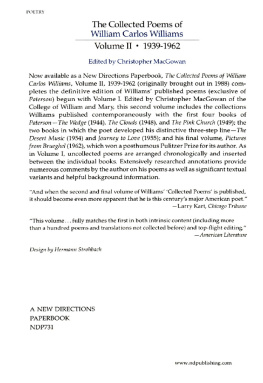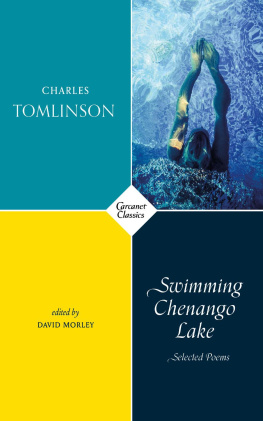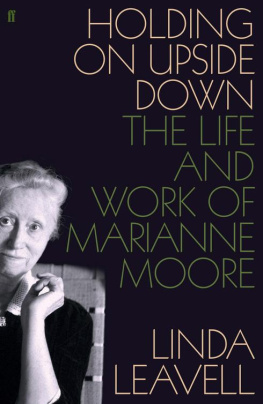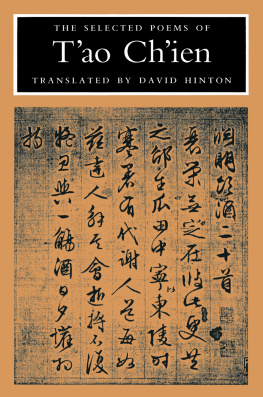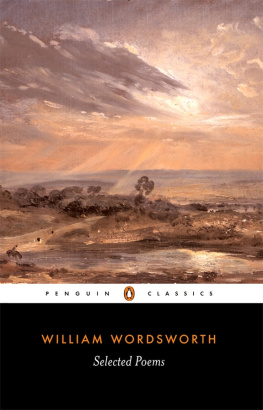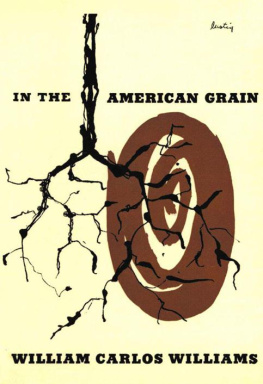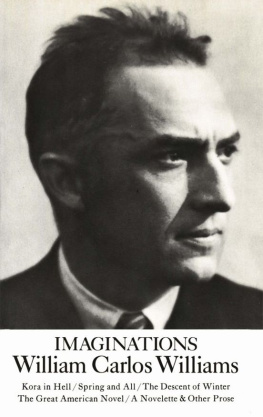William Carlos Williams - Selected Poems
Here you can read online William Carlos Williams - Selected Poems full text of the book (entire story) in english for free. Download pdf and epub, get meaning, cover and reviews about this ebook. year: 1985, publisher: New Directions, genre: Detective and thriller. Description of the work, (preface) as well as reviews are available. Best literature library LitArk.com created for fans of good reading and offers a wide selection of genres:
Romance novel
Science fiction
Adventure
Detective
Science
History
Home and family
Prose
Art
Politics
Computer
Non-fiction
Religion
Business
Children
Humor
Choose a favorite category and find really read worthwhile books. Enjoy immersion in the world of imagination, feel the emotions of the characters or learn something new for yourself, make an fascinating discovery.

- Book:Selected Poems
- Author:
- Publisher:New Directions
- Genre:
- Year:1985
- Rating:5 / 5
- Favourites:Add to favourites
- Your mark:
- 100
- 1
- 2
- 3
- 4
- 5
Selected Poems: summary, description and annotation
We offer to read an annotation, description, summary or preface (depends on what the author of the book "Selected Poems" wrote himself). If you haven't found the necessary information about the book — write in the comments, we will try to find it.
Selected Poems — read online for free the complete book (whole text) full work
Below is the text of the book, divided by pages. System saving the place of the last page read, allows you to conveniently read the book "Selected Poems" online for free, without having to search again every time where you left off. Put a bookmark, and you can go to the page where you finished reading at any time.
Font size:
Interval:
Bookmark:
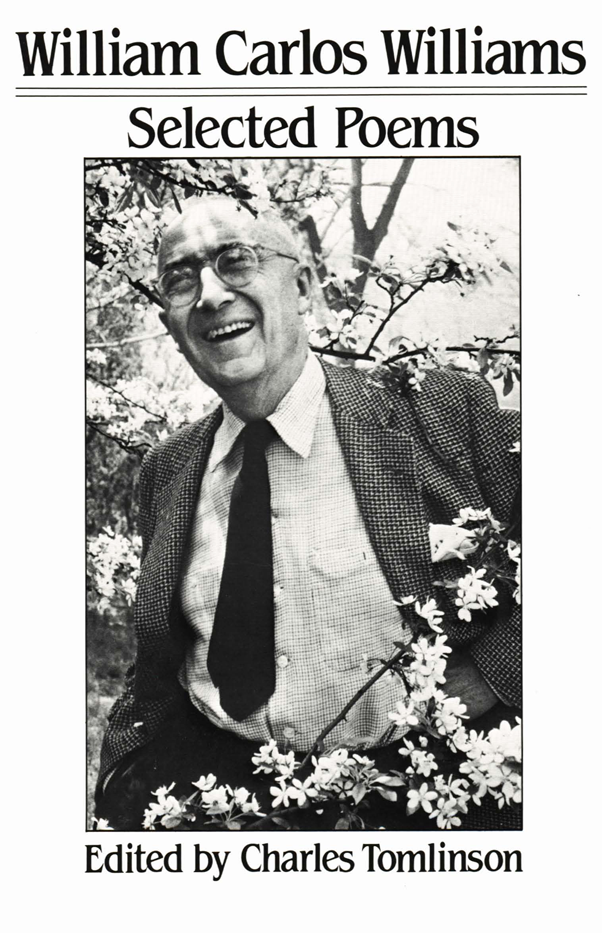
Eliots Prufrock and Other Observations. Pound was there to salute the arrival of both volumes and to differentiate them: Distinct and as different as possible from the orderly statements of an Eliot are the poems of Carlos Williams. If the sinuosities of Misses Moore and Loy are difficult to follow I do not know what is to be said for Mr Williamss ramifications and abruptnesses. I do not pretend to follow all of his volts, jerks, sulks, balks, outblurts and jump-overs; but for all this roughness there remains with me the conviction that there is nothing meaningless in his book, Al Que Quiere, not a line Perhaps Pound overstates the roughness of Williams, but, in pointing out the jerks, balks, outblurts and jump-overs, he has arrived at one of the earliest and most accurate formulations of what Williamss verse was about. Not only is locality (a sticking to New Jersey when Pound and Eliot had chosen European exile) the geographic source of Williamss poetry, but locality, seen as the jerks and outblurts of speech rendered on to the here and now of the page, is the source of his lineation. In the imaginative play of Williamss poems, where the attention is frequently turned upon outward things, the sound structure of the poems which embody that attention is an expression of strains, breath pauses, bodily constrictions and releases. Thus Williamss locality begins with a somatic awareness, a physiological presence in time and space, and this in quite early poems.
When he starts on his longest poem, Paterson, in the mid-forties, it is the remembrance of the act of walking through a given terrain which propels some of its best stretches, the gerund walking itself used as a repeated motif and, at one point, checked against the descriptions of an article, Dynamic Posture, from Journal of the American Medical Association: The body is tilted slightly forward from the basic standing position and the weight thrown on the ball of the foot, while the other thigh is lifted and the leg and opposite arm are swung forward (fig. 6 B ) A sentence from later on in this article (quoted by M. Weaver in his William Carlos Williams, The American Background) would doubtless have appealed to Williams in his identification of poet and walker: The good walker should be able to change pace, stop, start, turn, step up or down, twist or stoop, easily and quickly, without losing balance or rhythm The Williams poem finds analogies for most of these movements. The relation between subject and object appears in Williams in a series of images of physical straina poem from Al Que Quiere!, Spring Strains (p. 21), feels out its own balks and resistances against those of the scene outside where the swift flight of two birds is challenged, as: the blinding and red-edged sun-blur
creeping energy, concentrated
counterforcewelds sky, buds, trees,
rivets them in one puckering hold! At the close, the birds exert their own counterforce of speed and lightness, breaking out of the riveted landscape flung outward and updisappearing suddenly! the poem imparting a verb-like force to its combined prepositions, outward and up, and ending, as so often in Williams, on a dangling clause that pulls the main clause towards incompletion and asymmetry. This predilection for the open-ended and asymmetrical leaves Williams free to accept the suggestion of his surroundings with their evidence of overlap and relativity roof out of line with sides
the yards cluttered
with old chicken wire, ashes,
furniture gone wrong;
the fences and outhouses
built of barrel-staves
and parts of boxes Instead of wishing simply to reform the poor (Its the anarchy of poverty/delights me ), he senses there is a point where the imagination, partaking of this anarchy, could dance with it, could lift it to an answering form, but a form fully responsive to the waywardness and inconclusiveness of daily realities.
The broken fringes of the city in Morning (p. 133) witness a sort of heroism among diminished things, humorously absurd: And a church spire sketched on the sky,
of sheet-metal and open beams, to resemble
a church spire Williams hears in all this, and in the profusion of natural fact, a kind of musica vague melody/of harsh threads, as he says in Trees (p. 22) where the tree which first catches his eye is crooked, bent from straining / against the bitter horizontals of / a north wind, the jump-overs at the line breaks enacting the pressure of that straining. There is no romantic fusion of subject and object possible in this nature poem: the voices of the trees may be blent willingly / against the heaving contrabass / of the dark but the contra-bass remains contra, the crooked tree warps itself passionately to one side and the poem still presses forward as Williams adds in [its] eagerness, the poem like the tree dissociating itself from a blent music for that melody / of harsh threads. Bent puns and rhymes eagerly against blent in this piece. When Williams in his turn paid tribute to Pound, he saw the poethimself and Pound includedas seeking a language which will embody all the advantageous jumps, swiftnesses, colors, movements of the day He was praising the collage element in the poetry of Pounds A Draft of XXX Cantos, but the terms of his praise ignore those other elements of archaism and of the muse imaginaire that Williams distrusted in his friend.
Both Pound and Eliot, or so Williams felt, had lost contactit was a word whose meaning he was to go on exploringwith their American roots: they had sold out to Europe that American renaissance of which Pound himself had spoken, one which he had prophesied would overshadow the quattrocento. It was an old story, for the trend of the American mind back to Europe had grown in its appeal in nineteenth-century America. Williams, who feels the pull himself in his first novel, A Voyage to Pagany, reflected towards the end of his life: The novels of Henry James featured this seeking of Europe by the heiresses of America. He himself, for complex reasons fled to the assurances of Victorian England. It was understandable, it was even admirable in him. He became a distinguished citizen in the republic of letters and a great artist.
But he left another world behind. He abandoned it. Williamss poetry and novels explore an America his two most powerful contemporaries also left behind, in the raw merging of American pastoral and urban squalor. He described his struggle to make articulate that world, in Paterson, as a reply to Greek and Latin with the bare hands. Williams exaggerates, of course, and as he himself well knew his insistence on contact and locality needed for its completion an awareness that was also Europeanthe kind of awareness he recognized immediately in the reproduction of a painting by Juan Gris, with its cubist sharpness, its almost fastidious handling of a world of broken forms. Contact had been Whitmans word: I am mad for it to be in contact with me, says Whitman of nature in
Font size:
Interval:
Bookmark:
Similar books «Selected Poems»
Look at similar books to Selected Poems. We have selected literature similar in name and meaning in the hope of providing readers with more options to find new, interesting, not yet read works.
Discussion, reviews of the book Selected Poems and just readers' own opinions. Leave your comments, write what you think about the work, its meaning or the main characters. Specify what exactly you liked and what you didn't like, and why you think so.

